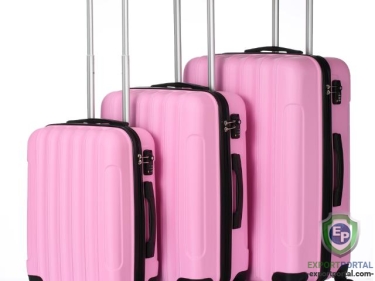Couldn't find the product you want?
Fill out this form to request the product.
Exports

Thailand is an emerging economy and is considered a newly industrialized country. It is the 2nd largest economy in Southeast Asia after Indonesia.
The economy of Thailand is heavily export-dependent, with exports accounting for more than two-thirds of gross domestic product (GDP).
Substantial industries include electric appliances, components, computer components, and vehicles. The Thailand industry has an annual output of near 1.5 million vehicles, mostly commercial vehicles. Most of the vehicles built in Thailand are developed and licensed by foreign producers, mainly Japanese and South Korean. The Thai car industry takes advantage of the ASEAN Free Trade Area (AFTA) to find a market for many of its products.
Agriculture has been experiencing a transition from labor-intensive and transitional methods to a more industrialized and competitive sector. Rice is the most important crop in the country and Thailand had long been the world's leading exporter of rice, until recently falling behind both India and Vietnam.
Electronics is Thailand's largest export sector, about 15% of total exports. Thailand exports over US$105 billion worth of goods and services annually. Major exports of Thailand include rice, textiles, footwear, fishery products, rubber, jewelry, cars, computers, electrical appliances, manufactured goods, machinery and equipment and foodstuffs.
Major export partners of Thailand are China, Japan, the United States, the European Union, Malaysia, Australia and Singapore.
Customs requirements of Thailand
Thailand Customs Contacts
Website: http://www.customs.go.th/wps/wcm/connect/CustEn/Home/HomeWelCome
E-mail: 1164@customs.go.th
Address: 1 Sunthornkosa Road, Klong Toey, Bangkok, 10110, THAILAND
Tel: +66 2 667 6000
Fax: +66 2 667 7767
Thailand is a country situated at the centre of the Indochinese peninsula in Southeast Asia. It is the world's 51st-largest country, bordered by Myanmar, Laos, Cambodia, the Gulf of Thailand, Malaysia, the Andaman Sea. Thailand shares maritime borders with Vietnam and Indonesia and India. The country is a member of Asia-Pacific Economic Cooperation (APEC), Association of Southeast Asian Nations (ASEAN), International Chamber of Commerce (ICC), World Trade Organization and other international organizations.
Tariffs
Thailand has a two-column tariff based on the Harmonised System. Tariff duties on goods are levied on numerous import items and on an ad valorem or a specific rate basis, whichever is higher. Suppliers or manufacturers invoices generally determine cost values and quantities. The customs authority, however, has the right to reassess the value of goods found to be valued manifestly lower than the market.
Preferential rates are accorded selective imports from other ASEAN countries.
The majority of imported articles are subject to two different taxes: tariff duty and Value Added Tax . Tariff duty is computed by multiplying the CIF value of the goods by the duty rate. This is added to the value of the goods to determine a final tax. VAT is then levied on the total sum of the CIF value, duty and excise tax, if any. Goods imported for re-export are generally exempt from import duty and VAT.
Import restrictions
Although most products are freely transportable within Thailand provided import duties are paid there are import restrictions on some products and exporters are required to check these with the Thai Ministry of Commerce prior to exporting.
The control of the import, marketing, distribution and sale of products is shared between a number of government bodies including the Food and Drug Administration (FDA), the Customs Department, the Ministry of Agriculture and the Ministry of Commerce.
The Ministry of Commerce designates classes of goods that are subject to import controls, which usually take the form of permission and licensing.
Product certification, labelling and packaging
Labelling
Strict requirements governing the labelling of dairy foods, baby foods, canned foods, vinegar, beverages, edible oil and fats, and gourmet powder (defined as an article containing monosodium glutamate (MSG) and used for food seasoning) must be met.
Food products must be approved and registered with the Food and Drug Administration (FDA). When seeking registration importers must supply two samples of each product, details of the exact composition by percentage of each ingredient, and six labels. Foodstuffs in sealed containers are subject to specific regulations.
Food products imported into Thailand must be labelled in Thai displaying specific information. General requirements for labelling food products must display the following information for consumers:
- Name and brand of the product (both generic and trade)
- Registration number
- Name and address of the manufacturer
- Name and address of the importer
- Date of manufacturing and expiry
- Net weight and volume
- Any additives used
- Health and nutritional claims (if any)
Labels for alcoholic beverages must advise the percentage of alcohol content. There must also be a health warning, printed in Thai, on the label or on a sticker, with specific wording.
Specific regulations govern the labelling on cosmetic products.
Labelling must indicate in the Thai language:
- The name and type of the product
- The name of manufacturer and address
- Directions for use
- Net contents
- A statement of caution if irregular use may cause injury
Packaging
Packaging should be secure and able to withstand extreme heat and humidity. Consideration should also be given for possible storage in the open. As merchandise may be landed in Thai ports from open lighters, waterproof packing should be used where necessary. The use of hay and straw should be avoided.
Special certificates
Certain types of seeds, plants and animals require phytosanitary certificates issued by the approved authority in the country of origin.
Meat imports must be accompanied by a veterinary health certificate signed by the official authority in the country of origin certifying that:
- the country of origin has been free from endemic diseases for the specified period
- the animal has been processed in an approved establishment in sanitary conditions under constant veterinary supervision
- the products are fit for human consumption and do not contain preservatives, additives or other substances in quantities harmful to human health
- they have not been stored for more than three months (the date of processing or packing must be stated
Documentary requirements
Pro-forma invoice
This is required for establishment of letter of credit, and should include similar details to the commercial invoice.
Commercial invoice
There is no prescribed form but precise details are obligatory. A minimum of five copies is needed.
- Required details include:
- Country of origin
- Country or countries from which purchased and consigned
- Date of purchase and sale - whether goods are sold, contracted to be sold, sent on consignment or supplied to branch firm
- Type of packaging (crates, drums, bundles etc.)
- Marks, numbers, gross and net weight of each package and total gross weight of consignment
- Total number of packages and number containing identical goods
- Complete description of goods, i.e. name, kind, quality, weight, size and/or grade of each item (for composite articles, show ratio of constituents), trademarks and other symbols
- Selling price or value per unit (in currency of transaction)
- Any other charges, including export bonus or subsidy, discounts, packing, insurance, freight, commission etc
Bill of lading/Airway bill
Two copies are required and must include:
- Number of shipper
- Ultimate and any intermediate consignees
- Markings and numbers of packages
- Any other details specified by importer
- Certificate of insurance
- A minimum of five copies is required
Packing list
A minimum of five copies is required, and must accompany each invoice if goods are packed in more than one case.
Certificate of origin
If requested, a Certificate of Origin must be issued by an approved authority.
Sources:
http://www.customs.go.th/wps/wcm/connect/custen/importexport/importer/importer+
